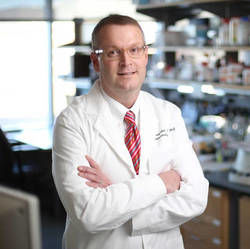Call Now Open
2026 Oxford-Harrington Rare Disease Scholar Award

Endocrine, Metabolic, Neuroscience
Novel Compounds for Diabetes, Psychiatric and Neurodegenerative Disorders
2016 Harrington Scholar-Innovator
Kevin Niswender, MD, PhD, Associate Professor, Medicine and Molecular Physiology and Biophysics at Vanderbilt University School of Medicine, steadfastly follows two principles in his professional life: develop those around him and tap into the collective genius.
Both are apparent in how he approaches his research. Dr. Niswender has a passion for research in the team setting with a connection to patient care. “When I learn what struggles my patients are experiencing, it feeds back to my research,” he says.
Trained as a physician-scientist with a PhD in glucose metabolism, Dr. Niswender has studied the neural control of metabolism for 15 years. Now, he and his team are tackling a therapeutic approach that they believe will address diabetes, obesity, and comorbid neurologic disorders such as depression and Alzheimer's disease. They are developing small molecules that modulate glucagonlike peptide-1 receptors found throughout the brain.
In his clinical practice, Dr. Niswender treats patients with obesity, metabolic syndrome and poorly controlled diabetes who often are depressed and struggle with motivation and cognitive control. “We're excited that targeting this receptor in this way may improve both the metabolic and neurologic aspects of disease,” he says. His experience includes involvement in clinical trials as well as basic science.
With his current project, he says, he is excited to be in “this translational phase of the drug development process” with Harrington Discovery Institute. “I know this is an uphill battle and the likelihood of success is low,” he admits. “But Harrington Discovery Institute has tremendous expertise to help us move ahead.”
Although Dr. Niswender and his team believe their approach will be effective for multiple diseases, for the immediate future they will focus on diabetes, he says. Of all the possible directions they could take, the path for drug development to treat diabetes “is the most straightforward,” Dr. Niswender notes.
This project holds the potential for generating attention from the public, the media and the medical world, but Dr. Niswender doesn't relish the spotlight. His family helps keep him grounded, he says. Despite his busy research and clinical schedule, he makes time for cooking with his wife and children, coaching his daughter's sixth-grade basketball team and simply spending time with his family.
“I find it very rewarding to understand the physiology [of the disease process] through research and apply it to patients in the clinic, and to take what my patients teach me about their struggles back to the lab.”
Source: Article from 2015-16 Annual Publication.